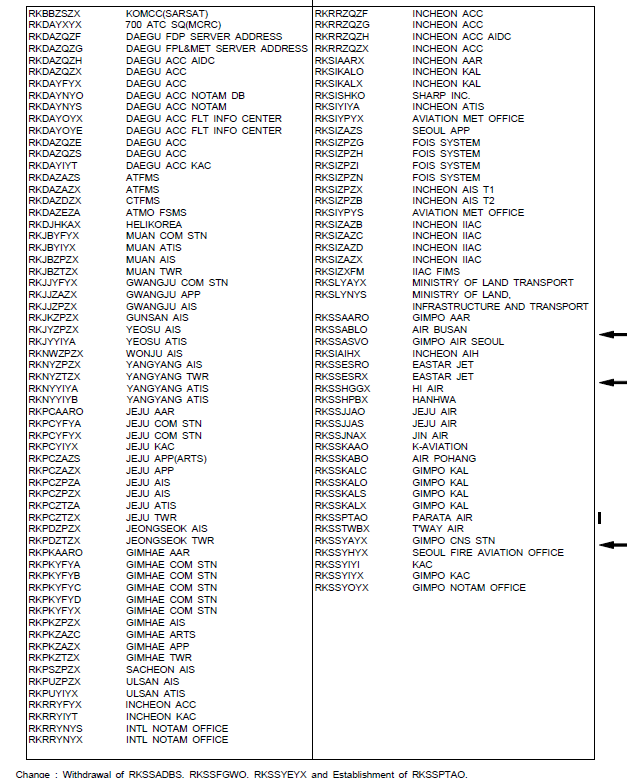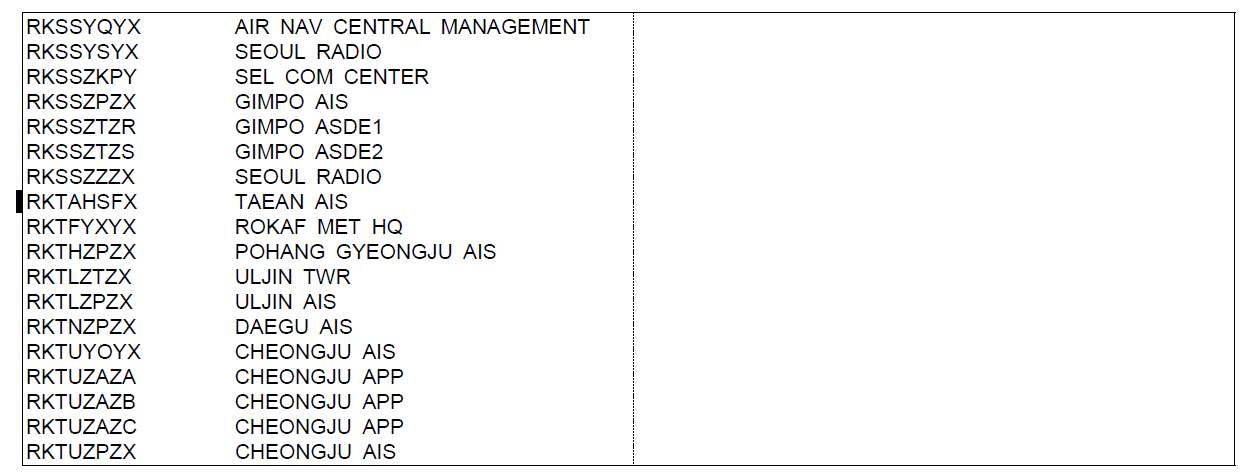GEN 3.4 COMMUNICATIONS SERVICES
Office of Civil Aviation
Ministry of Land, Infrastructure and Transport
11, Doum 6-ro, Sejong-si, 30103, Republic of Korea
Tel : +82-44-201-4361
Telefax : +82-44-201-5637
AFS : RKSLYAYX
Website : http://www.molit.go.kr
Area responsible for civil aeronautical telecommunication in the Republic of Korea is the same as Incheon FIR.
This service is provided for the interchange of message between aeronautical fixed stations, which is related to the safety of air navigation and to the regular, efficient and economical operation of air services.(Operational hours : H24)
-
Aeronautical Fixed Telecommunication Network(AFTN)
-
International AFTN circuits are illustrated in GEN 3.4.3.5.
-
International AFTN operations are applied in principle to the communication procedures of ICAO Annex 10, Volume Ⅱ.
-
-
Domestic Aeronautical Fixed Telecommunication Network
-
Domestic Aeronautical Fixed Telecommunication Network circuits are illustrated in GEN 3.4.3.5.
-
Domestic AFTN operations are applied in principle to the communication procedures of ICAO Annex 10, Volume Ⅱ.
-
This service is provided mainly to meet the requirements of the air traffic control service, aeronautical en-route information service and so forth by radio telephone between an A/G station and aircraft station.
-
Watch and hours of service
An aeronautical station in the mobile service should maintain continuous watch as hours of service and frequencies listed in 3.4.3.2.e. During its flight, an aircraft should maintain continuous watch as required by the aeronautical station and not cease watch, except for an emergency without informing the aeronautical station concerned.
-
Establishment of communications
An aircraft should normally communicate with the air ground control radio stations which exercise air traffic control in the area in which it is flying.
-
Messages handling
Information received from an aircraft by SEOUL Radio is transmitted in the form of AFTN message to the aircraft operating agency or the post concerned.
-
Language to be used
Language normally used in the air ground radio telephony communications should be either Korean or English.
-
SEOUL Radio
SEOUL Radio which is operated under the jurisdiction of The Ministry of Land, Infrastructure and Transport is in charge of a valuable link between ATC and an aircraft. Besides, such informations as NOTAM, weather and the like are given to an aircraft during its flight by SEOUL Radio, and SEOUL Radio receives position report and AIREP from an aircraft in the area beyond reaching of ATC authority and the above mentioned informations are transmitted to the post concerned. Frequencies of SEOUL Radio are as follows.(8903 kHz is used as a primary frequency within Incheon INTL Airport.)
Call sign
Frequencies
Hours of Operation
Remarks
SEOUL Radio
127.1 MHz, 3004 kHz, 4687 kHz, 6532 kHz, 8903 kHz, 10072 kHz, 13300 kHz, 13303 kHz, 13333 kHz, 17904 kHz, 17916 kHz
H24
MET Available
-
A pilot will find ready help and cooperation during its flight working in close harmony with ATC and SEOUL Radio.
The following of radio aids are available for air navigation.
-
Non-Directional radio Beacon(NDB);
-
VHF Omni-directional Range(VOR);
-
Distance Measuring Equipment(DME);
-
Instrument Landing System(ILS);
-
Radio Detection and Ranging(RADAR);
-
Tactical Air Navigation(TACAN);
-
Ground Controlled Approach(GCA) : Aircraft about to use GCA will receive instructions from appropriate ATC facility as to the channel to be used.
Applicable ICAO Standards, Recommended Practices and Procedures are contained in the following documents.
-
ANNEX 10 - Aeronautical Telecommunications
-
Doc 8400 - ICAO Abbreviations and Codes
-
Doc 8585 - Designators for Aircraft Operating Agencies, Aeronautical Authorities and Services
-
Doc 7910 - Location Indicators
3.5
| BEIJING COM CENTER ZBBBYFYX |
SEOUL COM CENTER RKSSYFYX |
FUKUOKA COM CENTER RJJJYFYX |
| DOMESTIC AFTN LIST |


|
NIL
NIL